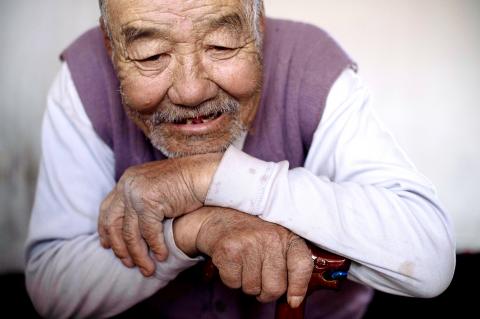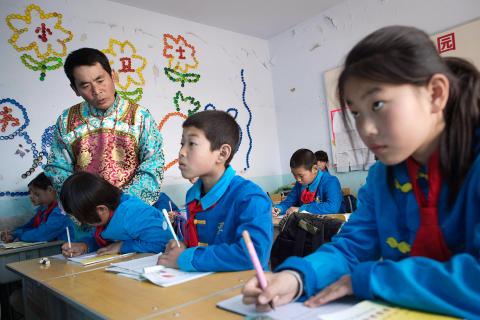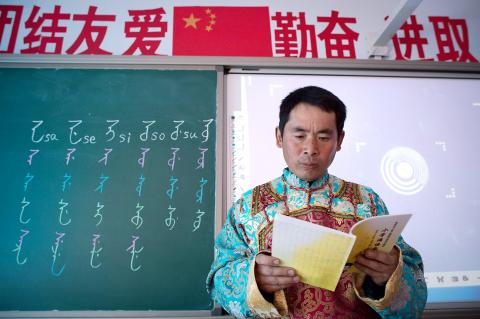It was the language of China’s last imperial dynasty which ruled a vast kingdom for nearly three centuries. But 71 year old Ji Jinlu is among only a handful of native Manchu speakers left.
Traders and farmers from what are now the borders of China and Korea, the Manchus took advantage of a crumbling Ming state and swept south in the 1600s to establish their own Qing Dynasty.
Manchu became the court language, its angular, alphabetic script used in millions of documents produced by one of the world’s preeminent powers.

Photo: AFP
Now after centuries of decline followed by decades of repression, septuagenarian Ji is the youngest of some nine mother-tongue speakers left in Sanjiazi village, one of only two places in China where they can be found.
“We mostly speak Chinese these days — otherwise young people don’t understand,” he said, in his sparsely-furnished hut beside cornfields, before launching into a self-composed Manchu lullaby.
Manchu is classed as “critically endangered” by the UN’s cultural organization UNESCO, which says that half of the more than 6,000 languages spoken worldwide are threatened with extinction, a major loss of knowledge and diversity for humanity.

Photo: AFP
But schemes to save Manchu are spreading as ethnic consciousness grows among the 10-million-strong minority.
The sign for the village primary school in Sanjiazi, in the northeastern province of Heilongjiang, is in Manchu’s vertical script, with posters in the language written by pupils lining its corridors.
Staring intently at an electronic display, a class shouted the Manchu alphabet, followed by words for “umbrella” and “cow.”

Photo: AFP
But instruction was in Chinese, the everyday language of school life, as were the bellowed lyrics of a song titled: We are the good Manchu children.
Teacher Shi Junguang, who painstakingly learned Manchu from older residents and records native speakers before they pass away, wore a red and turquoise robe with gold sleeves reminiscent of the group’s traditional apparel.
But, now, he said, the Manchu “don’t really have any special ethnic characteristics in food or dress.”
“The main thing we have here is the language.”
BARBARIAN MANCHUS
Under the Qing — or “pure” — dynasty, China saw massive territorial expansion before it weakened in the 19th century, assailed by corruption and pressure from European and other foreign powers.
Discrimination against non-Manchu Chinese remained rife and helped fuel a series of rebellions which finally saw the dynasty overthrown in 1911.
Republican leader Sun Yat-sen (孫逸仙) declared: “To restore the Chinese nation, we must drive the barbarian Manchus back to the Changbai Mountains,” their ancestral homeland.
Many remaining Manchus hid their language, a trend which intensified under Communist leader Mao Zedong (毛澤東), who launched campaigns to eradicate foreign and traditional culture.
At the height of Maoism, “No one spoke the language,” recalled Ji. “It was a time of destroying old culture. Who would dare?”
Political controls relaxed in the 1980s following Mao’s death, and Yang Yuan, an ethnic Manchu historian in Beijing, said: “Manchu consciousness has started re-emerging, and now it’s getting stronger and stronger.”
Several universities currently offer Manchu courses, and enthusiasts in major cities have formed clubs to study it. China has launched a massive project to translate Qing documents into modern Chinese, an effort aimed at promoting a view of the dynasty as essentially Chinese.
But the language is also studied by academics abroad, including many in Japan and the US.
Last year overseas historians were branded “splittists” whose work “endangers Chinese unity” in the official journal of the state-run Chinese Academy for Social Sciences, in a sign of official fears over Qing history.
But Harvard University professor Mark Eliot said that teaching Manchu was considered less of a threat by the ruling party than Tibetan or the language of the mainly Muslim Uighur minority, as China’s northeastern provinces were now “so firmly welded” into the country that accusations of separatism were implausible.
“That makes Manchu a little bit safer,” he added.
‘OUR ENGLISH IS BETTER’
Sanjiazi is “more of symbolic value as the last bastion of Manchu speakers,” Eliot said. “If the effort is to revive Manchu in a way that it would be used in everyday life, I don’t see much chance of success.”
Teacher Shi admitted that his charges only have “some understanding” of the language. Internet savvy young people have little use for it and dream of leaving the remote settlement. Outside school, a group of blue-uniformed children struggled to remember the Manchu word for “goodbye”, one adding in Chinese: “To be honest, our English is better.”
One of the few mother-tongue speakers, Meng Xianren, 85, recalled a poverty-stricken youth punctuated by traditional Manchu pursuits, such as rabbit hunting using trained eagles.
He repeated a Manchu phrase meaning “where are you from?” to 14-year-old Li Kechao, who hovered in his doorway.
She did her best to parrot the question back to the village elder, before admitting: “I don’t understand.”
Spitting on a stone floor, Meng declared: “Manchus once ruled over the Han people. But that time is over”.
“We’ve become like them,” he added with resignation. “There’s no difference.”

The Taipei Times last week reported that the rising share of seniors in the population is reshaping the nation’s housing markets. According to data from the Ministry of the Interior, about 850,000 residences were occupied by elderly people in the first quarter, including 655,000 that housed only one resident. H&B Realty chief researcher Jessica Hsu (徐佳馨), quoted in the article, said that there is rising demand for elderly-friendly housing, including units with elevators, barrier-free layouts and proximity to healthcare services. Hsu and others cited in the article highlighted the changing family residential dynamics, as children no longer live with parents,

The classic warmth of a good old-fashioned izakaya beckons you in, all cozy nooks and dark wood finishes, as tables order a third round and waiters sling tapas-sized bites and assorted — sometimes unidentifiable — skewered meats. But there’s a romantic hush about this Ximending (西門町) hotspot, with cocktails savored, plating elegant and never rushed and daters and diners lit by candlelight and chandelier. Each chair is mismatched and the assorted tables appear to be the fanciest picks from a nearby flea market. A naked sewing mannequin stands in a dimly lit corner, adorned with antique mirrors and draped foliage

The election of Cheng Li-wun (鄭麗文) as chair of the Chinese Nationalist Party (KMT) marked a triumphant return of pride in the “Chinese” in the party name. Cheng wants Taiwanese to be proud to call themselves Chinese again. The unambiguous winner was a return to the KMT ideology that formed in the early 2000s under then chairman Lien Chan (連戰) and president Ma Ying-jeou (馬英九) put into practice as far as he could, until ultimately thwarted by hundreds of thousands of protestors thronging the streets in what became known as the Sunflower movement in 2014. Cheng is an unambiguous Chinese ethnonationalist,

I was 10 when I read an article in the local paper about the Air Guitar World Championships, which take place every year in my home town of Oulu, Finland. My parents had helped out at the very first contest back in 1996 — my mum gave out fliers, my dad sorted the music. Since then, national championships have been held all across the world, with the winners assembling in Oulu every summer. At the time, I asked my parents if I could compete. At first they were hesitant; the event was in a bar, and there would be a lot